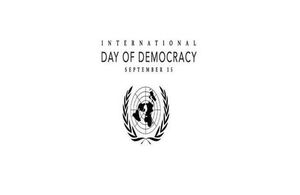British High Commission in Accra marks International Day of Democracy
The British High Commission in Accra marked International Day of Democracy on 15th of September, 2016.

International day of democracy
The UN has designated 15 September as “International Day of Democracy”. This year the theme is “Space for civil society”. Both have a particular resonance in Ghana as it looks towards elections on 7 December.
A free, strong and active civil society is a crucial part of any functioning democracy: it ask questions, it convenes, it conducts research and it drives debate – all to inspire thinking and to hold people to account. Ghana is rightly proud of its civil society. Successive governments has protected freedom of expression and assembly, and enabled the growth of many diverse and vibrant organisations. These have played an important role in every election since 1992; from critiquing manifestos, to hosting debates, to supporting the drafting of codes of conduct. And we are proud of the support it has given them.
In 2016 we are again supporting Ghana through a range of bilateral and multilateral interventions to achieve free, fair, credible and peaceful elections. We hope these will be another milestone in deepening Ghana’s democratic transformation and cementing its leadership in Africa.
Specifically on civil society, the UK, in partnership with the EU and Denmark, is funding a second phase of the STAR Ghana Programme and investing £22 million to support more effective and sustainable work in this field over the next four years. The programme aims to provide comprehensive, coordinated and strategic support to a range of organisations to enable Ghana’s citizens to hold those in power to account.
As it does, there are particular challenges that civil society needs to overcome to maintain and use the space it has been given: it must avoid becoming politicized; it must co-ordinate and work effectively when the moment demands; and it must do more to connect with and mobilize all Ghanaians, not only speak to an influential few. At no time are these things more important than ahead of elections. That is why we are helping fund 35 civil society organisations, including some media organisations, to achieve crucial objectives, including
- improving inclusion through support to the Ghana Federation for the Disabled (GFD) to assist Persons with Disabilities, by tackling physical/cultural barriers and stigmas to ensure this marginalised group can participate in the electoral process and have their interests represented
- strengthening accountability through Presidential and Parliamentary debates organised by the Ghana Broadcasting Cooperation (GBC) and Institute for Economic Affairs (IEA) and
- increasing national oversight of electoral processes through domestic observation, promoting national oversight of democratic process, through the Coalition of Domestic Election Observers (CODEO)
In addition, the UK’s Deepening Democratic Governance Programme (DDGP) has provided £4 million of support to civil society and key Electoral Management Bodies, promoting collaboration between state and non-state actors. We are also engaging with local media houses; debating their role in the elections, including responsible and non-biased reporting. Furthermore, we are supporting Joy FM’s ‘Joy Ballot Box’ programme which will tour Ghana gathering and discussing issues raised by the electorate. Engaging with the electorate and giving them a voice in this way is essential ahead of any election.
In marking the day, British High Commissioner to Ghana, HE Jon Benjamin said:
The 2016 International Day of Democracy should encourage us to think about the impact of local civil society in pushing for better governance in Ghana. The UK Government has a long history of support to civil society organisations in Ghana, spanning well over two decades, including the Ghana Research and Advocacy Programme (GRAP), Rights and Voice Initiative (RAVI) and more recently, Strengthening Transparency Accountability and Responsiveness (STAR) Phase 1 and 2. Crucial to all of these is sustainability and helping civil society to move from voice to action. This is particularly true ahead of the elections where civil society has a crucial role to play in holding Electoral Management Bodies, political parties, the media and other key stakeholders to account. We encourage civil society organisations to reach out to all Ghanaians, to canvas the views of everyone and represent those views fairly. We are proud of the work we are funding and hope that it will support Ghana to deliver free, fair, credible and peaceful elections in three months time.
Notes to the Editor
-
The Department for International Development (DFID) leads the UK Government’s fight against world poverty. UKAid is the logo used to demonstrate how the UK government’s development work is improving the lives of the world’s poorest people.
-
DFID is a committed development partner in Ghana. In addition to the programmes mentioned above, UK’s development assistance to governance in Ghana, which also includes support to civil society, including:
- Western Region Coastal Foundation: to improve stability and inclusive development prospects in the Western Region by better managing expectations and building relationships of trust between coastal communities and oil and gas companies.
- Ghana Oil and Gas for inclusive Growth: to improve inclusive economic growth and poverty reduction through improved management (including revenue capture) accountability and transparency.
- Ghana Revenue Reform Programme to improve the fiscal position of government through increased domestic revenue generation by closing the current tax gap.
- Strengthening Action Against Corruption in Ghana through more effective implementation of anti-corruption measures from scrutiny to punitive action increasing the risks for those engaging in corruption activities.